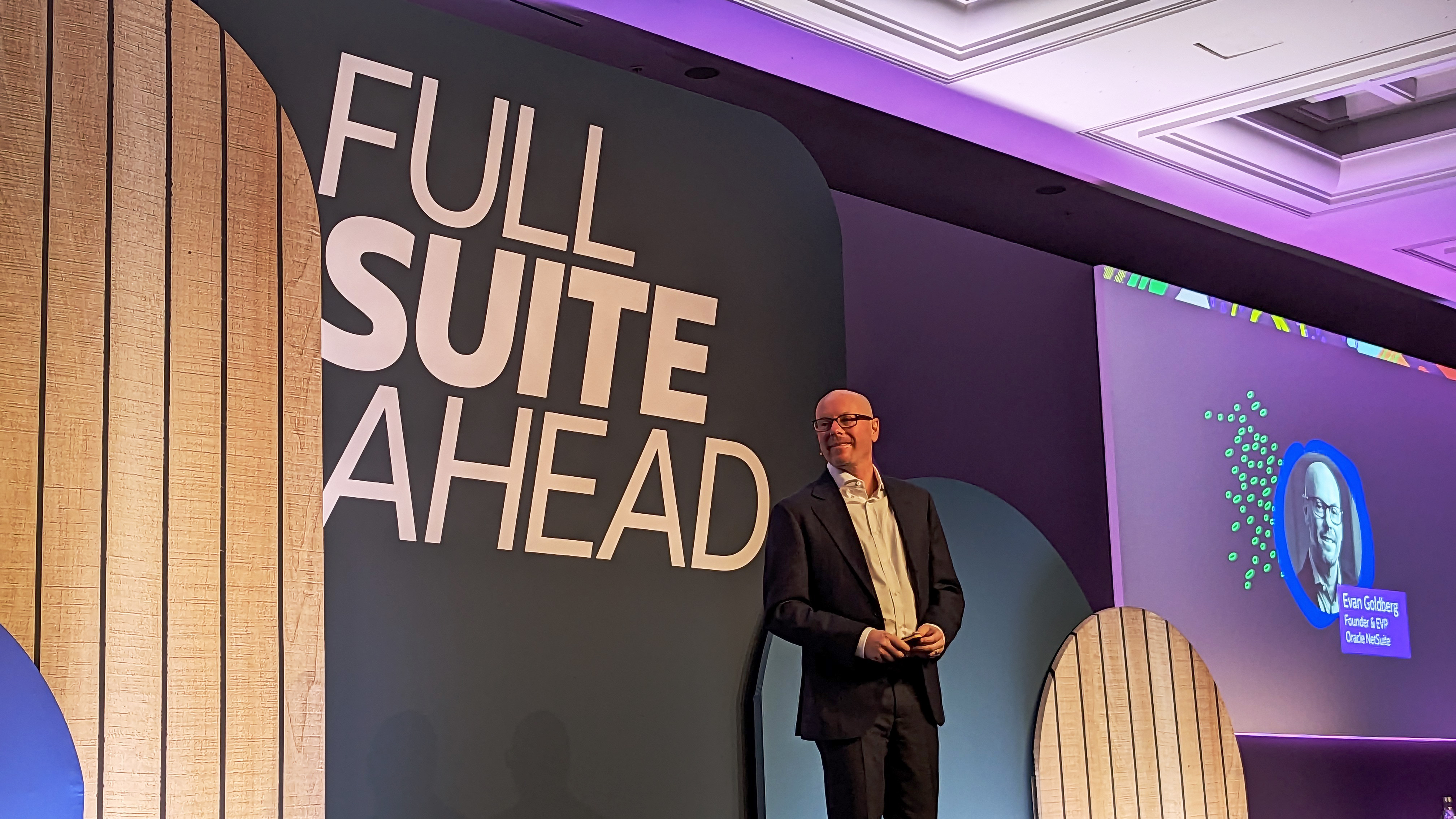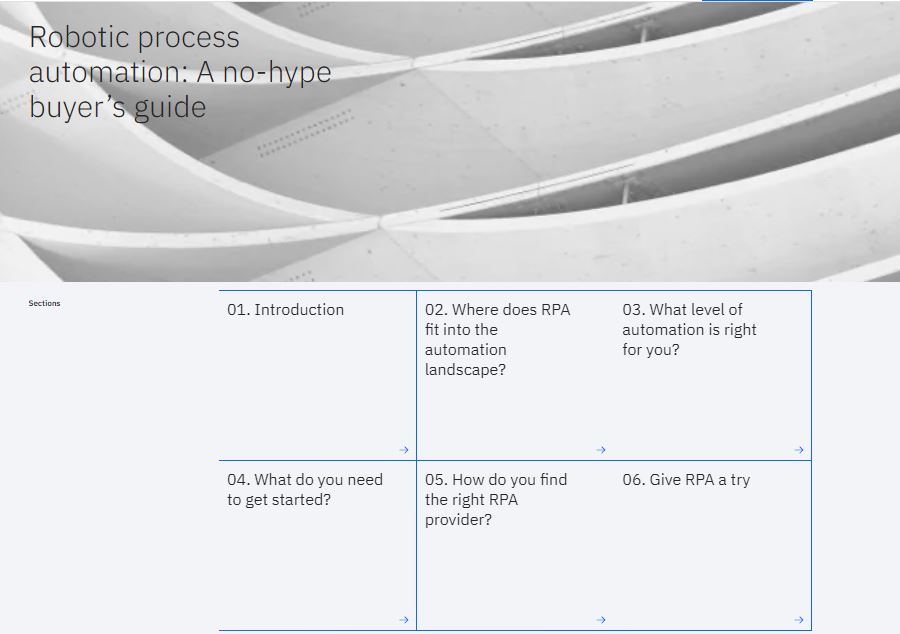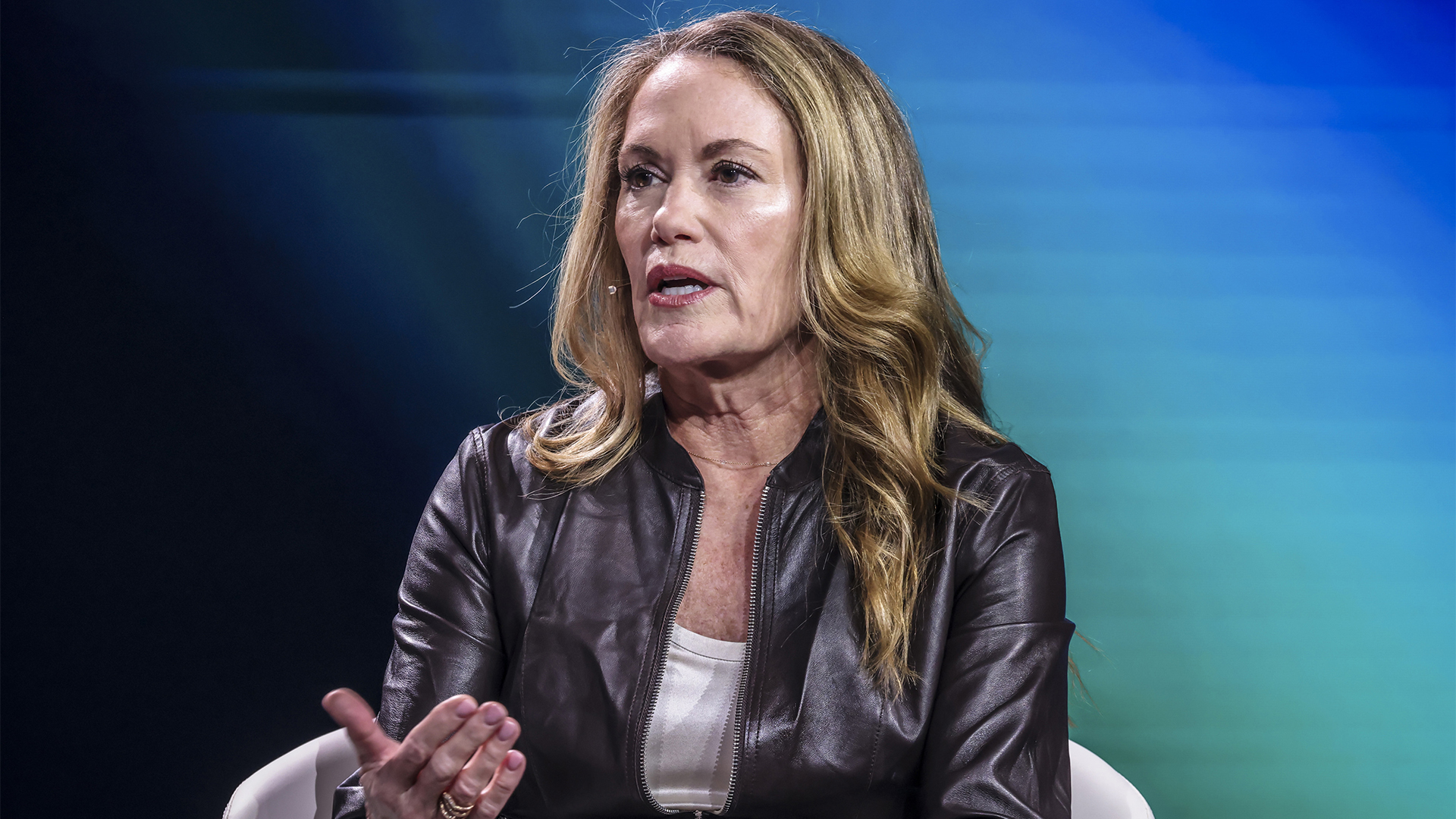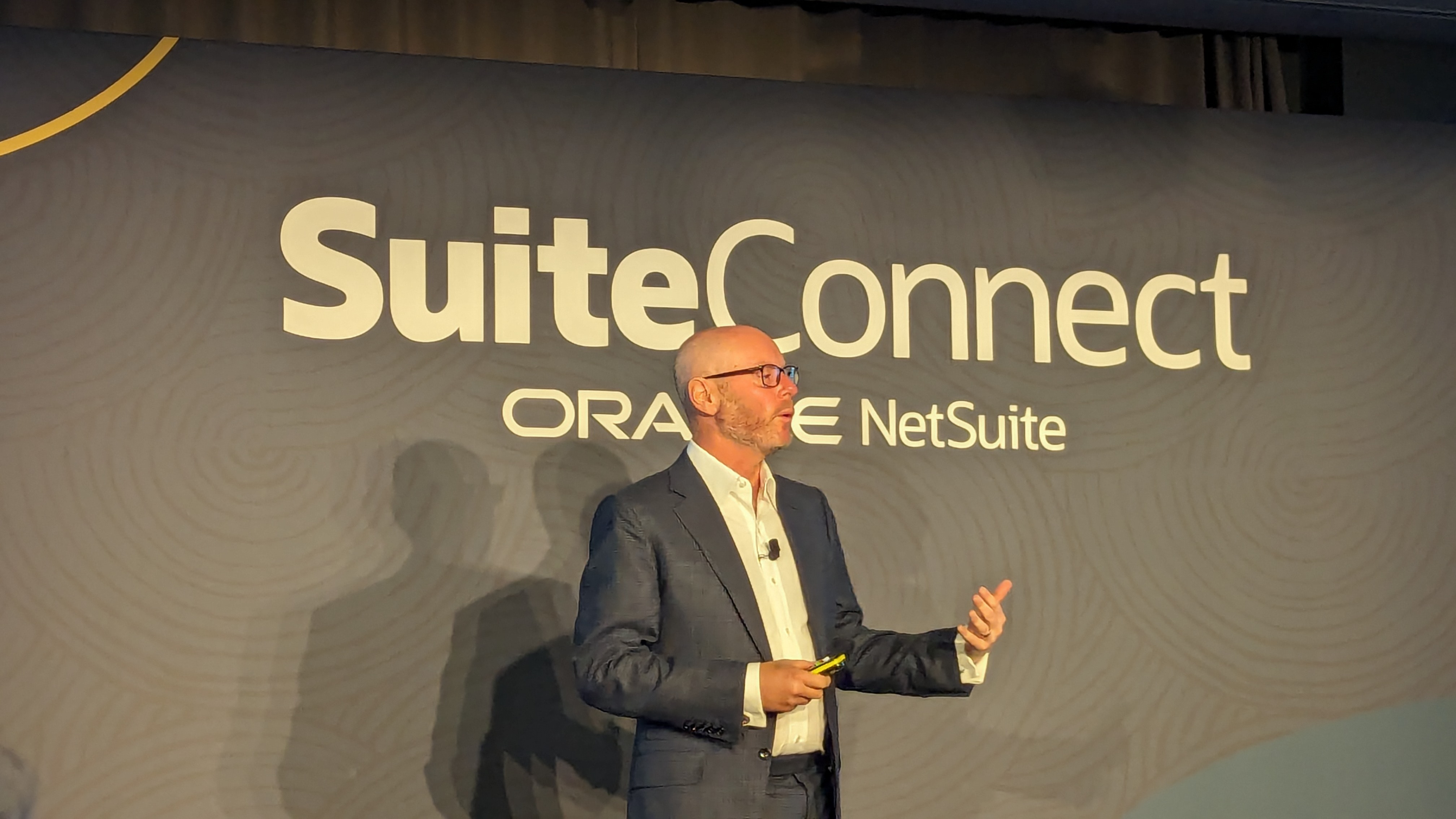NetSuite aims to be a ‘global local solution’, set to double down on automation
The ERP giant is betting that its all-in approach will lure customers in the uniquely-complex EMEA market


Oracle NetSuite has announced a range of updates to its tools designed to consolidate costs as customers battle recessionary cuts and sector-wide talent shortages.
Addressing delegates at its SuiteConnect conference in London on Tuesday, the company also affirmed its commitment to strengthening its localisation efforts for customers.
This includes adapting models for regional tax and regulatory requirements, as well as offering NetSuite's UI in 27 languages for a better user experience.
EMEA customers have specifically pointed to the complexity of VAT and customs compliance rules as piling on costs, particularly for organisations driven by product shipping or data transfer.
NetSuite has highlighted specific tools as antidotes for some of these regional issues. For example, the ERP giant has aimed to make supply chain management easier than ever through the use of products such as Oracle NetSuite Analytics Warehouse, the firm’s is a pre-built data warehouse based in the cloud.
In the new version of Analytics Warehouse, NetSuite has promised pre-built visualisations for industries such as manufacturing, software, and services.
This will include charts and graphs for greater insights, as well as key performance indicators (KPIs) that can be applied to a range of metrics such as project hours and case numbers.
Sign up today and you will receive a free copy of our Future Focus 2025 report - the leading guidance on AI, cybersecurity and other IT challenges as per 700+ senior executives
Although US customers can also make use of these capabilities, the firm has drawn specific attention to them with regards to the needs of EMEA customers.
RELATED RESOURCE

Complex VAT, customs, and data compliance rules have been registered as concerns across this region, and Russia’s invasion of Ukraine and subsequent fuel crisis have highlighted the need for flexible supplier prices.
62% of NetSuite customers identified rising costs as their primary concern in a recent survey, with energy prices a point of specific worry.
Although Analytics Warehouse has been available in the UK since September 2022, Evan Goldberg, founder and EVP at Oracle NetSuite, said that a number of improvements have been made to the tool based on customer feedback.
These include a range of new transaction types that the tool can draw on including data sets in sales, inventory, financials and support management. Data sets such as the new Cross Charge Journal, which allows financial teams to track charges across subsidiaries.
IT Pro was given the example of a company using this to seamlessly track invoices for a product shipped to an England-based customer from an Ireland-based supplier.
In the keynote speech, a representative from NetSuite customer Charlotte Tilbury praised the firm’s widening focus on prebuilt models. These can be applied to help businesses automate functions in a range of different tax and legislative environments.
“I’ve never come across another ERP which allows us to set up a subsidiary as quickly as NetSuite,” said Aman Deep, business systems director at Charlotte Tilbury.
“And not just setting up subsidiaries. We have had to change the organisational structure and hierarchies, there was much more to it.”
A global, local approach
NetSuite’s ‘Full Suite Ahead’ mantra buoyed it through its SuiteWorld conference in September, and stressed the importance of adopting an all-or-nothing approach in order to get the most value out of its tools.
At the time, Goldberg had stated that he was “not worried” about competitors located in regions into which NetSuite expands, as its unique full-suite approach is its selling point rather than any one service. The company has previously stated it aims to provide the world’s ‘most localised ERP system’.
“We have this tagline we use which is ‘act global, be local’,” James Chisham, VP product management at Oracle NetSuite, told IT Pro.
“So it's that notion of global capabilities on a kind of worldwide scale, but built for users in a specific market.”
NetSuite’s focus on prebuilt models for a number of different regions, which can react to changes in tax and regulatory requirements are part of this. But it is also reflected in the growing degree to which tools in NetSuite’s range integrate with third-party applications, even those of competitors.
Analytics Warehouse now comes with more than 40 third-party data sources including Google Analytics, Salesforce, and Shopify. NetSuite states that this simplifies the blends of data that an organisation may be handling, and strengthens the quality of analytics.
It’s a prime example of NetSuite’s current strategy, in which holistic customer experience appears to be prized over individual product returns.
RELATED RESOURCE

“We’ve been really amazed by the takeup of NetSuite Analytics Warehouse, because NetSuite has built-in analytics”, Goldberg told IT Pro.
“First of all, we’re finding that our customers, not just in the software industry but in many industries, have a tonne of data in other systems. I just talked to someone here at the conference about how they’re excited to use it for legacy data from their previous NetSuite system, so we’re finding all kinds of use cases for that.”
Goldberg also stressed that EMEA leads the US in some NetSuite developments.
“There are definitely areas where we are EMEA-first, certainly on some of the automation of transactions. Europe and the UK are ahead of the US there.”
NetSuite has placed an increasing focus on automation in recent years. Core to its idea of centralising applications and data across businesses, it has emphasised its ‘full suite’ as uniquely capable of hosting the kinds of end-to-end automation that businesses can use to reduce strain on teams.
Asked about automation being used to tackle skill shortages, Chisham was quick to admit that individual needs still need to be addressed, and that automation is not a silver bullet for lack of talent.
“We want to use automation where it makes sense. Where we feel some of the skills shortage hits is availability of skill. You know what's happened over the last few years, it's well documented, tech companies have been hiring aggressively, you know?”
“So there's been a real difficulty in finding the right types of people. I think that that's the same for our customers as well, it's getting the right people in the right positions. And you know, automation in and of itself is not going to solve all of those challenges.”
A future led by automation
Going forward the firm will be investing more heavily in artificial intelligence (AI) and machine learning (ML), which it already uses for products such as NetSuite Supply Chain Control Tower and its Intelligent Recommendations feature.
Cormac Watters, EVP of EMEA applications at Oracle, told IT Pro that rollout of AI would be greatly backed up by existing Oracle cloud infrastructure.
“NetSuite and indeed Fusion both run on our OCI platform. This means we as Oracle, when we deploy new machine learning or AI algorithms, techniques, data assessments, can make it available to all of the products and their portfolio.”
“I think the world has moved, and that AI and machine learning are now no longer considered gimmicky. I think it's real and it's there to be used. So there's actually an expectation from customers, ‘what's the latest piece of machine learning you can give me?’”
Further detail on these developments is expected at its next SuiteWorld conference in October 2023.

Rory Bathgate is Features and Multimedia Editor at ITPro, overseeing all in-depth content and case studies. He can also be found co-hosting the ITPro Podcast with Jane McCallion, swapping a keyboard for a microphone to discuss the latest learnings with thought leaders from across the tech sector.
In his free time, Rory enjoys photography, video editing, and good science fiction. After graduating from the University of Kent with a BA in English and American Literature, Rory undertook an MA in Eighteenth-Century Studies at King’s College London. He joined ITPro in 2022 as a graduate, following four years in student journalism. You can contact Rory at rory.bathgate@futurenet.com or on LinkedIn.
-
 Gender diversity improvements could be the key to tackling the UK's AI skills shortage
Gender diversity improvements could be the key to tackling the UK's AI skills shortageNews Encouraging more women to pursue tech careers could plug huge gaps in the AI workforce
-
 Researchers claim Salt Typhoon masterminds learned their trade at Cisco Network Academy
Researchers claim Salt Typhoon masterminds learned their trade at Cisco Network AcademyNews The Salt Typhoon hacker group has targeted telecoms operators and US National Guard networks in recent years
-
 ‘DIY’ agent platforms are big tech’s latest gambit to drive AI adoption
‘DIY’ agent platforms are big tech’s latest gambit to drive AI adoptionAnalysis The rise of 'DIY' agentic AI development platforms could enable big tech providers to drive AI adoption rates.
-
 Application enablement in an AI world
Application enablement in an AI worldHow enterprises can tap into AI-fueled application enablement to build apps faster and deploy them while consuming fewer resources
-
 AI agent announcements are a dime a dozen right now – here’s what Oracle thinks it’s doing differently
AI agent announcements are a dime a dozen right now – here’s what Oracle thinks it’s doing differentlyNews Oracle’s latest foray into the world of AI agents will leverage the firm’s strength in infrastructure and come at no additional cost to users.
-
 Can robots work safely alongside humans? This one industry leader thinks we're not far away
Can robots work safely alongside humans? This one industry leader thinks we're not far awayNews Humanoid robots and people will be able to work truly side-by-side this year, according to the CEO of one leading robotics company.
-
 Reinventing procurement
Reinventing procurementWhitepaper From cost center to innovation driver
-
 Oracle bets on vector search capabilities to drive enterprise AI value
Oracle bets on vector search capabilities to drive enterprise AI valueNews Oracle claims its new tool will bring AI “to where the data is,” rather than the other way around
-
 NetSuite doubles down on localized AI with UK, EMEA product launches
NetSuite doubles down on localized AI with UK, EMEA product launchesNews Regional product launches aim to address struggles with ESG reporting and surface more data insights for NetSuite’s EMEA customers
-
 Oracle ditches the hype for a straight talking generative AI approach
Oracle ditches the hype for a straight talking generative AI approachAnalysis Oracle knows it has to box clever in the generative AI race, and its ambitions rest on delivering tangible enterprise use-cases